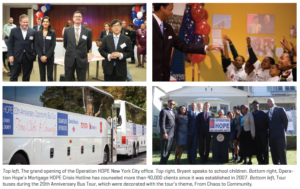By Julie Hayes
In 1992, Los Angeles, California faced political and social upheaval following the acquittal of four white police officers who had been videotaped beating black motorist Rooney King. Issues of racial discrimination and police violence had been common since the civil rights movement, but the Los Angeles riots triggered by the jury’s verdict opened up another question to equal rights activists: were institutions with power such as the police force, legal system, and government being used to keep minorities and the poor in their “proper” place?
Twenty years later, the nonprofit Operation HOPE is still working to fight the consequences of this societal trend. Founded in Los Angeles by John Hope Bryant after the L.A. riots, Operation HOPE is looking to celebrate their twentieth anniversary through continuing service to impoverished areas, working to increase financial literacy, and promoting a future where economic inequality is a thing of the past.
“Because of what happened to [King], the city changed, the Los Angeles Police Department changed, a community became actively engaged in its own redemption, and the global organization I founded, Operation HOPE, was born,” says Bryant, who is also celebrating his twentieth year as Operation HOPE’s CEO. “I am convinced that I would have never founded Operation HOPE, in its unique form, structure and approach, if it had not been for the unfortunate events of April 29, 1992.”
As the leading United States nonprofit organization in the field of financial literacy and economic empowerment, Operation HOPE has much to celebrate. Through championing the Silver Rights Movement, which calls for equal access to capital and highlights ways to make America’s capitalist economy work for the poor and underserved, Operation HOPE’s years of service have been marked by the development of initiatives and programs meant to educate and empower those who wish to aim for economic equality, an increase in financial education and literacy among youth and adults alike, and heightened efforts to involve corporate America and financial organizations in reaching out to the poor and impoverished.

After two decades as an organization, Operation HOPE has individually served over 1.2 million people in 273 United States cities, as well as locations in South America and Haiti. However, Operation HOPE’s ultimate goal is to no longer be a necessity to society through the full realization of a thriving capitalist economy and the elimination of financial injustice.
To move closer to this goal, Operation HOPE launched a series of celebratory and empowering events and programs in 2012 to increase awareness and participation in their mission throughout the community. In July, the organization partnered with Gallup to found the American 2020 campaign, a national movement to lower high school dropout rates and foster entrepreneurship among the future political, economic, and business leaders of the United States.
American 2020 was created to assist the Business in a Box program, launched at the beginning of the anniversary year to provide entrepreneurship grants to young adults and children. For the 2013 business and school year, Operation HOPE is looking at ways to integrate these two campaigns into American educational systems and extend their reach to as many young entrepreneurs seeking mentoring as possible. By the end of the year, the organization hopes to have made progress towards their goal of quadrupling the percentage of students with an active business role model, from 5 percent to 20 percent.
“The Gallup HOPE index has shown us that 91 percent of all kids are not afraid to take risks, and that 77 percent of all kids want to be their own boss,” says Bryant. “But only 5 percent of kids have a business role model or a business mentor. That’s devastating. This program will kick off their economic energy, make financial literacy relative to their lives, make them more excited about education and graduation, and make ‘dumb’ uncool and ‘smart’ cool again.”
Operation HOPE’s capstone event in their anniversary celebrations, the HOPE Global Financial Dignity Summit in Atlanta, Georgia, followed up the November election by addressing how political leaders can set up a long-term system to solve some of America’s current financial crises, with focus on financial dignity, literacy, recovery, and stability. U.S. Federal Reserve Chairman Ben Bernanke headlined the event.
Operation HOPE plans to bring the ideas discussed during the Summit to Congress. Citing Dr. Martin Luther King, Jr. as one of the most influential motivators of Operation HOPE’s initiatives, Bryant looks forward to the day when the Silver Rights Movement will be a high priority among America’s politicians.
“With this discussion, we want to pick up respectfully where King left off with the conversation and the question of ‘Where do we go from here? [Will there be] chaos or community?’” says Bryant.
Though the future of financial equality is Operation HOPE’s ultimate concern, the organization has used the past anniversary year to pay homage to their roots. When the Los Angeles riots stirred up questions of racism and civil rights two decades ago, it made a lasting impression that is still influencing society and politics today. After twenty years of service, Operation HOPE believes they, too, are making an impression that will continue to change the lives of Americans for years to come.






